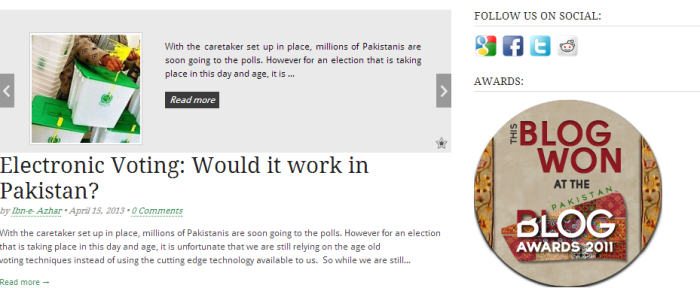 Originally published in Seedhi Baat .com.pk on 15 April 2013.
Originally published in Seedhi Baat .com.pk on 15 April 2013.
With the caretaker set up in place, millions of Pakistanis are soon going to the polls. However for an election that is taking place in this day and age, it is unfortunate that we are still relying on the age old voting techniques instead of using the cutting edge technology available to us. So while we are still following the traditional route, let’s have a look at how the rest of the world is harnessing the potential of technology to conduct more economical, fair and transparent elections.
To begin with 2 important parameters in an electoral process are the “vote casting” and the “vote counting “processes. Based upon these two parameters the electoral process can be categorized into four types.
First is the Manual voting system, which is essentially a paper-based voting system in which votes are cast and counted manually, with no involvement of any mechanical or electronic machine.
Second system is the Mechanical voting system which reduces the human involvement in an electoral process to a certain extent. Normally in such a system the ballots are cast manually but counting is done through a specialized counting device..
The third type of voting is the electronic voting system. The term includes different methods of voting and encompasses the electronic means of casting and counting votes. The most commonly adopted version is a Direct Recording Electronic System which is essentially a standalone or networked computer. Voters can view ballots on a screen and make choices using input devices like buttons or a touch screen. Electronic Votes are stored on a memory card, compact disc and are transferred electronically or manually to a centralized location for counting.
Fourth type or the ideal type of voting system so far would be a public Internet voting system that could allow the voters to cast their votes over the internet from their desktops, laptops or mobile phones. In this system the casting as well as counting would be over a secure network and physical presence of a voter will not be required.
Although the first mechanized voting device was patented in 1892 but for nearly a century the United States was the only country using automated voting equipment. Over the years significant efforts had been carried out to develop and implement a voting system commensurate with modern technology in other parts of the world .Few of the important mile stones achieved by different countries in last two decades are:-
- Brazil introduced e-voting for its Parliament elections in 1996.
- First Internet Voting trial in Germany was conducted in 1998.
- Seven French cities in 1999 tested Internet Voting during the European Parliament Elections.
- Several states in the US implemented and run Internet Voting in 2000.
- In 2007, Parliament elections in Estonia were conducted through Internet voting.
- In 2008, German constitutional court ruling demanded transparency and verification mechanisms as an essential requirement for e-voting.
- The Netherlands banned the use of electronic voting machines in 2008.
- More recently Norway introduced Internet voting at the municipal elections and Swiss living abroad were able to cast their vote over the Internet.
Electronic Voting –Success Stories
Philippines Presidential Elections
In the 2010 presidential elections of Philippines, optical scanning machines were used for the first time to automate the election process. More than 38 million Filipinos had their votes counted by optical scanning machines. This success of 2010 Filipino elections was rooted in a devastating presidential election six years earlier in 2004. The hall mark of this system was the independent testing and software code review process to develop the trust of the voters on the system. The e-voting system helped Filipinos know the winner of the presidential election within 48 hours after the polls closed. Transparency, speed and the trust of people made the election a success.
Brazilian Success in e-Voting
Brazilians have a comparatively longer history and interest in electronic voting. The process started back in 1986 when the Superior Electoral Court initiated the automation process by establishing single national registration numbers, which replaced the existing voter’s certificate. At that time with 70 million registered voters, it was the largest electronic registry of voters in Latin America. In the 1998 General Election, two thirds of all Brazilian voters had already voted electronically, because of the establishment of electronic ballot boxes. However, the electronic voting system project reached its peak in the 2000 Municipal Elections, which covered 100% of Brazilian voters. Later in 2008, a Biometric Voting System was introduced in the Municipal Elections to enhance the security of the voting. In the 2010 general elections, more than one million Brazilians voted through biometrics. According to a survey, 88% of the voters rated the system as good or excellent quality of work.
It can be concluded that the electronic voting has many advantages apart from few limitations.
For Pakistan unfortunately the elections of 2013 have to be conducted in almost a century old manner. May be in the future we can finally start moving towards the transparent electronic voting system.



